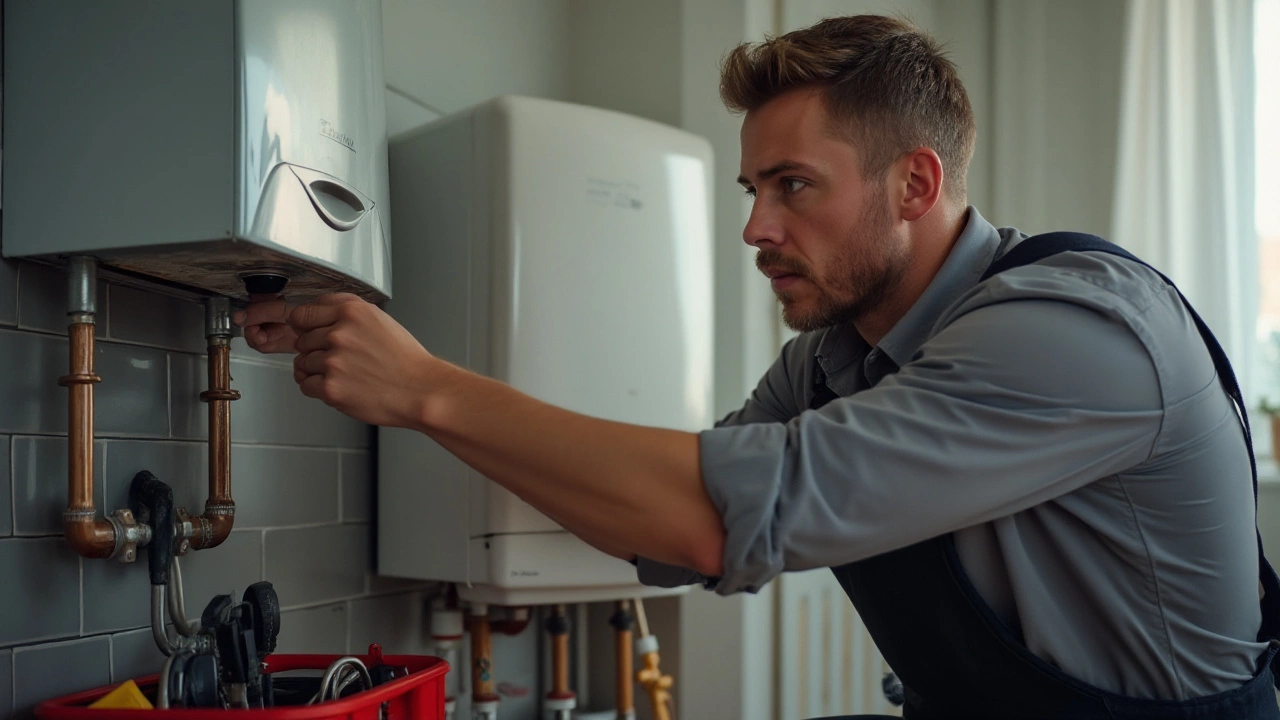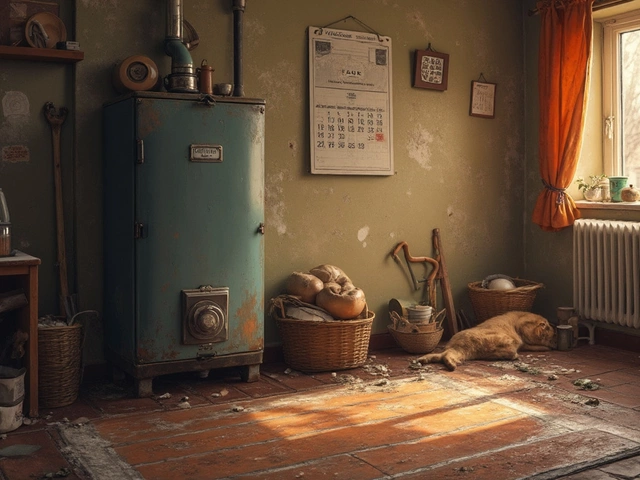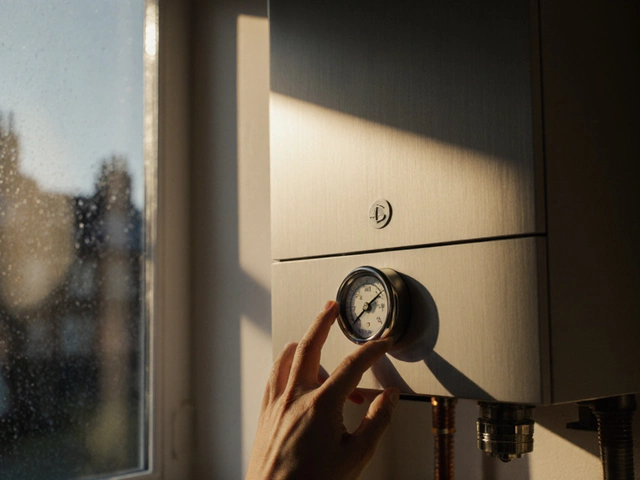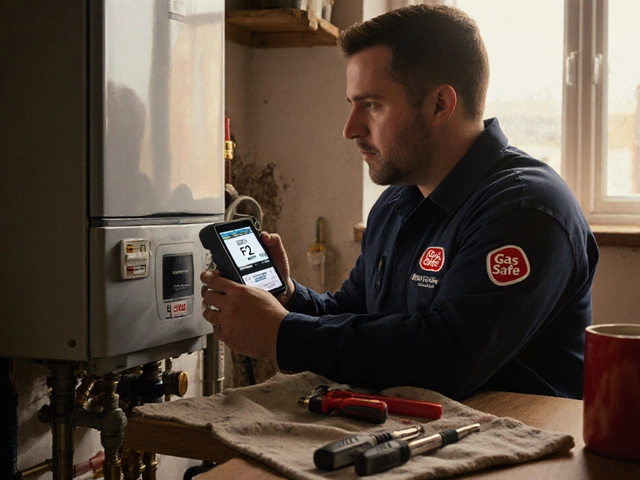Heating is a crucial element in our lives, particularly when the chill of winter sets in. A well-maintained boiler ensures that the warmth we enjoy is reliable and efficient, making a significant difference in our energy bills and comfort.
The health of your heating system depends not only on fixes when things go wrong but regular attention to prevent issues. This isn't just about knowing when to call an expert; it's about embracing some preventive steps yourself and recognizing the signals that hint at looming problems.
With a bit of understanding and timely action, one can keep the boiler in excellent working condition, ensuring peace of mind and continued comfort through the colder days ahead.
- Understanding Boiler Basics
- Routine Maintenance Tasks
- Signs Your Boiler Needs Repair
- DIY Maintenance Tips
- When to Call a Professional
Understanding Boiler Basics
Boilers are the unsung heroes of our homes, tirelessly working behind the scenes to keep us warm. If the idea of a house without a boiler sends a chill down your spine, understanding the basics of these systems is your first step to fostering a healthy relationship with your heating system. Essentially, a boiler heats water using a fuel source—be it gas, oil, or electricity—to produce hot water or steam, which then heats the home. Not all boilers are created equal; some homes may have combi boilers that provide instant heating and hot water without a storage tank, while others depend on system boilers that require a separate tank. Regardless of the type, each boiler serves the same primary function: transferring heat throughout the home.
While it may seem like rocket science at first, getting acquainted with your boiler's anatomy can demystify the process. The primary components include the burner, which initiates the heating, and the heat exchanger that conducts heat into the water. Then there’s the pump that ensures the distribution of heat, and don't forget the safety features like pressure relief valves to keep things running smoothly and safely. Is your boiler making strange noises or losing pressure? These hints point towards potential problems. According to energy experts, regular maintenance of a boiler is as essential as routine car servicing, and doing so can increase its efficiency by approximately 10%.
An industry veteran, John Summers, once said, "A well-maintained boiler is like a well-tuned instrument in an orchestra; one wrong note, and it throws the entire symphony off."
A basic understanding is incomplete without knowing about your system's efficiency. Modern boilers are incredibly efficient, often boasting ratings upwards of 90%. Older units, however, might still be operating at as low as 65%, leading to higher energy costs and less effective heating. What dictates this efficiency? Boiler efficiency is primarily determined by the combustion performance and the system's ability to minimize heat loss in its operation.
Investing time in learning how your boiler works can limit unexpected failures and help you make informed decisions about repairs and replacements down the road. There's always more beneath the surface when it comes to our home heating systems, and recognizing their importance in our daily comfort can lead to more effective maintenance strategies—and a toastier home environment.
Routine Maintenance Tasks
Keeping up with boiler maintenance isn't just about ensuring warmth during harsh winters; it's about sustaining a home's heart. Regular checks and balances are essential, like the foundations of a sturdy building. Many boiler owners might not realize, but regular maintenance involves more than just a superficial glance over controls and gauges. Every season brings its schedule, yet certain checks remain constant. The first step in a strong maintenance routine is frequently inspecting the pressure levels. Most boilers need a pressure between 1 to 2 bar for ideal performance. Ignoring this can result in inefficiency or worse, damage. Additionally, bleeding the radiators periodically ensures they remain air-free, maximizing heating output.
The next in line is the examination of vent pipes and air openings. Boilers need sufficient airflow to function without hitches. Blocked vents can lead to carbon monoxide build-up, a dangerous event most people wouldn't anticipate. Clean those vents regularly, and ensure no items block them. Then, there's the matter of cleaning the boiler cabinet where dust settles easily over time. Dust acts as a silent killer, clogging essential components and reducing the machine’s lifespan. The boiler’s burner should also not be overlooked—soot can accumulate there, affecting efficiency. A simple brush-off can work wonders in keeping it clean and efficient.
Water levels in a boiler are as crucial as fuel in a car. Regular inspection can prevent potential damages from lack of water, which overheat and break down boilers. Additionally, checking the flame in your boiler—a steady blue flame indicates a healthy system. An orange or yellow flame could signal issues within the system, possibly with the gas supply or oxygen intake. If it doesn’t burn true, it’s time to call an expert. Experts often highlight the importance of listening to your boiler. Strange noises are cries for help, indicating air entrapment, scale build-up, or even failing components. According to a seasoned engineer in the industry, "A boiler speaks volumes if only we listen, and choosing to ignore even faint whispers can mean costly repairs later."
"A boiler speaks volumes if only we listen, and choosing to ignore even faint whispers can mean costly repairs later." – Anonymous Engineer
Homeowners should also focus on the pilot light. Though modern systems often switch to electric ignition, the light, if used, must burn brightly and consistently. The boiler’s lifespan can be significantly impaired by failures here, leading to frequent ignition issues or unplanned shutdowns. Flushing the boiler’s system is crucial, too, especially in areas with hard water. Over time, sediment and lime scale can form a solid layer, reducing heat exchange efficiency and leading to stress and damage. Regularly flushing can help avoid these problems, in many ways like how a gardener regularly waters and tends to plants for optimal growth.
Adhering to a routine checklist of maintenance tasks creates a barrier against common boiler issues. This thorough regular checking can seem tedious at first, but with time, it becomes both a routine and a ritual, ensuring a warm, safe haven no matter how biting the frost outside. Always remember, a little time spent on regular maintenance ensures prolonged service and peace of mind when you need it most.

Signs Your Boiler Needs Repair
It's easy to take your heating system for granted when everything is working smoothly, but being unaware of warning signals can lead to unexpected repair costs and uncomfortable days without heat. Recognizing the signs that your boiler needs repair requires keen observation and a little bit of knowledge about the way your system typically operates.
One of the first indicators of trouble is unusual noises. If your boiler emits banging, whistling, or gurgling sounds, it might signal issues such as air in the system, low water pressure, or impending pump failure. While some noises can be benign, consistently odd sounds are a cause for attention and often necessitate a professional inspection.
A sudden drop in heating efficiency is another red flag. If you notice radiators taking longer to heat up or areas of your home no longer warming evenly, it might indicate a problem with the boiler's internal components. Homeowners should not ignore these issues, as delays in addressing such problems can result in higher energy bills and discomfort.
Inspect your boiler regularly for any visible leaks, as they are more than just a minor inconvenience. Pooling water around the base of the boiler often suggests a serious problem like a damaged seal or a faulty pressure valve. Over time, leaks can worsen, leading not only to system damage but also to structural issues in your home. A timely repair can prevent costly damage down the road.
A noticeable and persistent drop in water pressure is another telltale sign that your boiler might need repair. Normal pressure levels are vital for an efficient heating system. A drop could mean there's a leak in the system or a radiator that needs bleeding. In some cases, this might require recalibration of the pressure settings by a professional.
Additionally, keep an eye on your energy bills. A sudden spike without a change in your habits can hint at a boiler working inefficiently, striving harder to meet your heating needs. Although sometimes seasonal changes can contribute to higher energy usage, don't overlook this sign if your consumption habits haven't changed.
Finally, look for the pilot light turning yellow instead of blue. A yellow flame can mean the boiler might not be burning fuel correctly, possibly due to a carbon monoxide leak, which is both a health hazard and an efficiency issue. Such problems require immediate professional attention to ensure safety and restore your boiler's proper function.
"A proactive approach to boiler maintenance can significantly extend its lifespan, reduce the likelihood of unexpected failures, and enhance operational efficiency," says renowned HVAC specialist, Martin Lacey.
Considering these factors can help you identify when your boiler requires attention. Being vigilant and calling in professional help at the first sign of trouble will keep your heating system running effectively and your home comfortably warm.
DIY Maintenance Tips
Taking care of your boiler maintenance doesn't necessarily mean you need to call in a professional every time. Engaging in some simple DIY efforts can make a huge difference to the efficiency and longevity of your system. These tasks may seem small, but they directly impact how well your boiler manages to heat your home, potentially saving you from bigger issues down the line. Let's delve into some effective DIY maintenance tips that you can easily incorporate into your household routine.
The first thing you want to keep an eye on is your boiler's pressure level. Ideally, you want the pressure gauge to read between 1 and 1.5 bars. This is crucial because improper pressure levels can prevent your boiler from functioning effectively, or worse, cause it to shut down. If you notice issues, refer to the manufacturer's manual to adjust the pressure safely. Checking this every few months can prevent surprise shutdowns during the crucial winter months when your heating system is needed the most.
Another key aspect of maintaining an efficient boiler is ensuring the radiators are in good condition. Radiators sometimes trap air inside them, which can prevent them from heating up fully. This, in turn, leads to a less efficient heating system and higher energy bills. Bleeding your radiators periodically can help. Simply use a radiator key to release trapped air, allowing hot water to circulate freely, thus maximizing heat output and ensuring that your heating system runs at its best.
One part of boiler upkeep people often overlook is the cleanliness of the environment around it. Dust and debris build-up can impact the performance of your boiler. Make it a habit to regularly clean the area where the boiler is installed. A clean surrounding not only provides your boiler with adequate ventilation, it also helps prevent accidental fires. Good housekeeping practices go a long way in reducing the likelihood of needing massive boiler repair interventions.
Don't neglect checking for leaks and unusual noises. Any sign of moisture or strange sounds coming from the boiler could signal that something's off. These could be early warnings of parts that might fail soon, giving you a chance to address these problems before they escalate. Listening to your boiler and taking action on these clues will help you address minor issues before they become costly repairs.
If you want to ensure your boiler is in the best possible condition, consider adding inhibitor liquid to the water in your system. Inhibitors prevent rust and limescale from forming inside the pipes and the boiler, which are two major causes of boiler failure. Adding this liquid requires draining some water from the system and replacing it with a mixture of your selected inhibitor. Always follow the product guidelines to ensure you're using the correct amount.
"A well-maintained boiler is a safe boiler, and a little attention goes a long way to keep it running smoothly," says John Doe, a renowned heating system expert.
Finally, insulation plays a big role in optimizing your heating system. Making sure that exposed pipes are properly insulated can prevent heat loss, helping your boiler work less hard while still keeping your home warm. Adding foam insulation around the pipes in areas like the attic or basement keeps the whole system in good shape, maintaining the energy efficiency of your home in the long run.

When to Call a Professional
In the realm of boiler repair, there are times when the challenges faced might be beyond personal expertise, requiring professional intervention. It is crucial to recognize these moments early to prevent small issues from escalating into major problems. One of the first signs that calling a professional is necessary is when you notice inconsistent heating throughout your home. This could imply an issue with the boiler's pressure or circulation system, both of which require a skilled technician to diagnose and repair.
Another critical moment to seek professional help is when strange noises are emanating from your boiler. Rumbling, whistling, or banging sounds might indicate a serious problem, such as a buildup of limescale or air blocks in the system. Attempting a DIY fix in these situations can be risky and might cause further damage. According to the UK Health and Safety Executive, faulty broilers can pose risks of carbon monoxide poisoning, reinforcing the importance of professional oversight.
If your boiler is leaking, this is a definite red flag that should not be ignored. Leaks can cause water damage, leading to costly repairs and even jeopardizing the safety of your home. A certified engineer can quickly identify the source of the leak and take remedial action. Additionally, consulting with a professional is wise when your boiler consistently turns itself off. This might be an indicator of a variety of issues such as thermostat problems, low water pressure, or blocked pipes. These problems often require advanced tools and techniques to troubleshoot effectively.
A seasoned technician can perform routine inspections and offer advice tailored to your specific model and circumstances, as noted by the Home Heating Association: "Regular professional maintenance is not only a safeguard against unexpected boiler breakdowns but also a promise of energy efficiency and extended appliance longevity."
Regular maintenance checks by a qualified technician can uncover issues that are not immediately obvious. During their visit, a professional might conduct an inspection and cleaning of key components, check the gas pressure, and ensure emissions are within safe limits. They will adhere to industry standards ensuring the boiler is compliant with safety regulations, a task that's vital yet typically overlooked by untrained hands.
| Common Issue | Professional Response |
|---|---|
| Inconsistent Heating | Diagnose circulation problems, adjust pressure levels |
| Strange Noises | Check for limescale, clean or replace affected parts |
| Boiler Leaks | Inspect seal integrity, replace parts as needed |
In conclusion, being proactive and recognizing the signs early can save you from a cold night or a hefty repair bill. While minor maintenance tasks can be handled independently, don't hesitate to call a professional boiler repair service when complexities arise or your safety is at risk. The peace of mind knowing your heating system is in expert hands is invaluable, especially when winter is in full swing.




